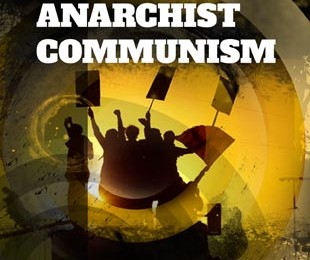
A Short Introduction to Anarchist Communism
Glossary
The following terms will be used in this pamphlet:
Anarchism
An economic and political system based upon removing oppressive and exploitative structures in society (such as capitalism and the state), and building a society where everyone has an equal input into decisions that affect their life.
Capitalism
An economic and political system based around exploiting those forced to sell their labour, in which a country’s trade and industry are controlled by private owners for profit.
Class
A set of people given a shared title based on something they hold in common. Anarchists often talk of class in terms of an economic relationship, which this pamphlet will examine.
Communism
An economic and political system based around common ownership of the means of production (such as factories, fields and workshops), where goods are made available based upon need and ensuring the well-being of all.
Concession
Something given in response to a demand, action, or prevailing standard.
Economy
The system used to work out how goods and resources are produced and allocated to people. The current economy is capitalist, but other forms of economy are possible.
Free Market
A proposed form of capitalism where businesses can act however they want without any legal restrictions. It is often proposed along with removing the state completely, as if the two are completely separate, however the state is required for capitalism to be possible.
Hierarchical
The nature of hierarchy. A system in which members of an organisation or society are ranked according to relative status or authority.
Infrastructure
The basic physical and organisational structures required for a project to function (including anything from a small team activity through to running a country or global capitalism).
Institutional
Of, relating to, or characteristic of an institution. For example: Institutional racism.
Intersections
The points at which different things come together. Often used in anarchist text to talk about the interaction between multiple systems of oppression, discrimination and/or privilege.
Leftist
Used to refer to authoritarian or hierarchical left-wing organisations (such as trade unions and political parties), or their members.
Means of Production
The non-human infrastructure needed for production of items, such as fields, factories and workshops (and their associated tools). Keep in mind that workshops can include such diverse locations as kitchens, office space, and laboratories to name but a few examples.
Oppression
The state of being subject to oppressive treatment. The exercise of authority or power in a harmful or unjust manner.
Pragmatism
A way of doing things or of thinking about problems that is seen as reasonable and logical due to dealing with practical outcomes.
Social Revolution
A revolution undertaken by the majority of the working class that removes all class divides. Not to be confused with a political revolution, where the people at the top may change but a class structure remains in place.
Solidarity
The act of undertaking supportive activity towards other people which does not come with the expectation of reward, but instead comes from a sense of mutual aid or common interest.
Squatting
Occupying an abandoned or unoccupied area of land or a building and putting it into use without the owners permission.
State, The
The collected institutions that create and enforce laws created by a small minority of people within a given territory. Through laws the state claims that only it has the right to grant the use of violence. The state uses the law to justify and protect a capitalist economy.
Strike
Taking direct action against a boss, usually in the form of a picket line that will prevent all activity at a workplace.

Social Media